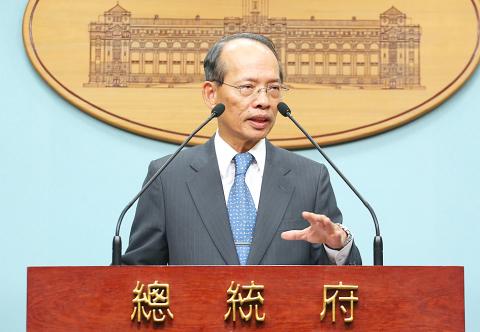The Ministry of Foreign Affairs yesterday said President Tsai Ing-wen (蔡英文) would interact naturally with representatives of China and other nations without diplomatic ties with Taiwan at the inauguration ceremony of the newly expanded Panama Canal later this month, as it released more details of Tsai’s first overseas state visit.
“From the ministry’s understanding, China will be sending the deputy head of its Ministry of Commerce’s Department of Outward Investment and Economic Cooperation, who is relatively low-ranking, to attend the ceremony,” Deputy Minister of Foreign Affairs Javier Hou (侯清山) told a news conference at the Presidential Office.
Hou said Tsai is expected to have “natural interactions” with Beijing’s representative at the ceremony on June 26 in Panama, just as she would with representatives of Taiwan’s other non-diplomatic allies.

Photo: CNA
It means Tsai would not be indifferent to the representatives should they approach to say hello and might respond by giving a nod, Hou said, adding that Tsai is also likely to hold bilateral meetings with the leaders of the nation’s nine diplomatic allies invited to attend the ceremony.
According to Tsai’s itinerary, she is to embark on her nine-day trip on Friday next week and arrive the next day in Panama, where she is scheduled to attend the inauguration ceremony on June 26 before departing for Paraguay the next day.
During her stay in Paraguay, Tsai is to meet with Paraguayan President Horacio Cartes and deliver a speech to the parliament, before leaving on June 30.
Tsai’s chartered plane is set to touch down at Taiwan Taoyuan International Airport on July 2.
The president is to be accompanied by National Security Council Secretary-General Joseph Wu (吳釗燮), Presidential Office deputy secretaries-general Jason Liu (劉建忻) and Harry Tseng (曾厚仁), Minister of Foreign Affairs David Lee (李大維) and seven businesspeople from the food, solar energy, high-tech textiles and power generation sectors.
Hou said the government is hoping to demonstrate its sincerity in strengthening ties with its diplomatic allies through Tsai’s visit, which he termed the Ying Hsiang Project (英翔專案).
Given the nation’s allies’ expectations to enhance bilateral trade and investment ties, Hou said the president’s overseas visit has also set itself the mission of encouraging Taiwanese companies to make investment trips to the nations in the hopes of creating mutually beneficial relationships.
“In addition to visiting the two diplomatic allies, Tsai is also scheduled to transit through two US cities: Miami on her way to Panama and Los Angeles on her way back,” Hou said, adding that Taipei and Washington are still ironing out the details of the stops.
Asked whether China is upset by Tsai’s transit stops in the US and whether the government has sought to communicate with Beijing on the matter, Hou said Tsai’s overseas state visit is a matter for Taiwan to decide without sounding out the opinions of other nations.
“We have established a tacit understanding with the US and it is the primary nation with which we have coordinated,” Hou added.

The CIA has a message for Chinese government officials worried about their place in Chinese President Xi Jinping’s (習近平) government: Come work with us. The agency released two Mandarin-language videos on social media on Thursday inviting disgruntled officials to contact the CIA. The recruitment videos posted on YouTube and X racked up more than 5 million views combined in their first day. The outreach comes as CIA Director John Ratcliffe has vowed to boost the agency’s use of intelligence from human sources and its focus on China, which has recently targeted US officials with its own espionage operations. The videos are “aimed at

STEADFAST FRIEND: The bills encourage increased Taiwan-US engagement and address China’s distortion of UN Resolution 2758 to isolate Taiwan internationally The Presidential Office yesterday thanked the US House of Representatives for unanimously passing two Taiwan-related bills highlighting its solid support for Taiwan’s democracy and global participation, and for deepening bilateral relations. One of the bills, the Taiwan Assurance Implementation Act, requires the US Department of State to periodically review its guidelines for engagement with Taiwan, and report to the US Congress on the guidelines and plans to lift self-imposed limitations on US-Taiwan engagement. The other bill is the Taiwan International Solidarity Act, which clarifies that UN Resolution 2758 does not address the issue of the representation of Taiwan or its people in

US Indo-Pacific Commander Admiral Samuel Paparo on Friday expressed concern over the rate at which China is diversifying its military exercises, the Financial Times (FT) reported on Saturday. “The rates of change on the depth and breadth of their exercises is the one non-linear effect that I’ve seen in the last year that wakes me up at night or keeps me up at night,” Paparo was quoted by FT as saying while attending the annual Sedona Forum at the McCain Institute in Arizona. Paparo also expressed concern over the speed with which China was expanding its military. While the US

SHIFT: Taiwan’s better-than-expected first-quarter GDP and signs of weakness in the US have driven global capital back to emerging markets, the central bank head said The central bank yesterday blamed market speculation for the steep rise in the local currency, and urged exporters and financial institutions to stay calm and stop panic sell-offs to avoid hurting their own profitability. The nation’s top monetary policymaker said that it would step in, if necessary, to maintain order and stability in the foreign exchange market. The remarks came as the NT dollar yesterday closed up NT$0.919 to NT$30.145 against the US dollar in Taipei trading, after rising as high as NT$29.59 in intraday trading. The local currency has surged 5.85 percent against the greenback over the past two sessions, central